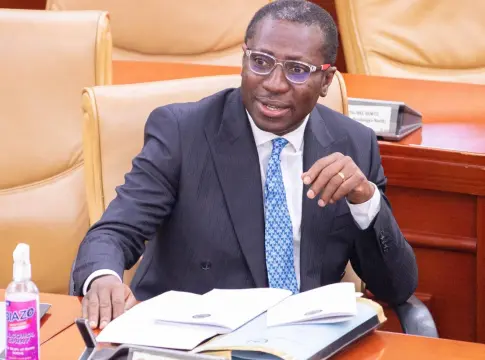In the intensifying rhetoric surrounding Ghana’s judiciary and political transition, one message stands out with sobering clarity: retaliatory politics is a dangerous path that threatens the very soul of the country’s democracy.
This was the caution issued by Hon. Alexander Afenyo-Markin, Minority Leader in Parliament, in response to statements made by NPP Communicator, Dennis Miracles Aboagye.
Aboagye, in a controversial pronouncement, stated that a future New Patriotic Party (NPP) government would dismiss all seven Supreme Court justices recently nominated by President John Dramani Mahama.
While the comment has stirred debate, Afenyo-Markin firmly distanced himself and the NPP’s parliamentary caucus from that line of thinking. In his words, Ghana must resist the politics of vengeance and move toward unity and governance for the greater good.
According to Afenyo-Markin, embracing retaliatory politics creates a destructive loop with no clear resolution.
“But where would it lead us to… If we, as a political class, are paying attention to data, we will realize that the masses are getting a bit concerned and suspicious of our conduct.
“NDC may think that they are enjoying some goodwill, but what they don’t know is that through these actions [engaging in retaliatory politics], they themselves are eroding the goodwill rather speedily.”
Hon. Alexander Afenyo-Markin
His concern was not only about political instability but also the erosion of public trust in leadership and state institutions. In a political culture already strained by polarization, this warning is timely.
Accordingly, he emphasized the need for accountability to apply not just to those currently holding political office, but also to those aspiring to lead.

This insistence on shared responsibility speaks to a deeper national sentiment—one shaped by growing public discontent.
Across Ghana, many citizens are visibly weary of the recurring political hostility that accompanies each transfer of power.
The Majority Leader lamented that rather than focusing on continuity or progress, new governments often prioritize dismantling the achievements of their predecessors—not out of principled disagreement, but as acts of political revenge.
This, he noted, has become a troubling hallmark of Ghana’s democratic cycle, fostering division, eroding trust in governance, and reinforcing the perception that leadership is more about settling scores than serving the public interest.
Politicians Urged To End Retaliatory Politics
Rather than perpetuate this cycle, Hon. Alexander Afenyo-Markin urged Ghana’s political elite to mature past score-settling and refocus on governance. This means recognizing the value of institutions, like the judiciary, beyond the narrow lens of party interest.
Judicial independence, after all, is not a partisan luxury but a cornerstone of a functioning democracy.

Reflecting on Ghana’s post-independence journey, Afenyo-Markin pointed to the extended rule of the PNDC and the successive administrations that followed, suggesting that despite the passage of time and multiple leadership changes, the tangible achievements of these governments remain limited.
“Look at all the experiences, PNDC, 11 years, NDC1, NDC2, NDC3, NPP1, and NPP2. What have we done as a political class that has hurt the nation and hasn’t helped our democracy? Retaliatory politics.”
Hon. Alexander Afenyo-Markin
His rhetorical question lands a powerful critique on decades of governance marked by blame games and short-term political advantage.
Rather than delivering long-lasting reform, this approach has left Ghana stuck in a holding pattern, lacking continuity in policy, weakening institutions, and increasing public apathy.
Afenyo-Markin’s call is also a reminder that political actors are not just party functionaries—they are national leaders.

“I’m saying that as individuals in the space, as actors, we would have our own issues. But beyond this is governance. And that is where I want the direction to be.”
Hon. Alexander Afenyo-Markin
This call for change is especially timely, given Ghana’s current economic challenges.
With rising unemployment, deepening hardship, and widespread disillusionment with the political class, the country can no longer sustain a cycle of reprisals. Citizens are demanding practical solutions, not political score-settling.
In the end, political parties may come and go, but institutions like the judiciary must endure. The practice of targeting judges based on who appointed them undermines this permanence and weakens the rule of law. It turns courts into partisan battlegrounds instead of forums for justice.
“So if I come and say, oh, it’s happened to Osimisi, so why are you complaining? It’s because people were not happy. That is why today we are being called upon to make it better.”
Hon. Alexander Afenyo-Markin
For the country to move forward, it must resist the easy temptation of revenge and choose instead the harder path of reform, maturity, and national unity. Only then can Ghana begin to repair the trust its citizens have lost—and build a future not shackled by the past.
READ ALSO: Government Ramps Up Climate Financing to Bridge Gap




















